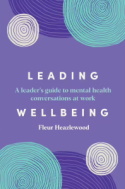All leaders struggle with their confidence from time to time, Rebecca Houghton* offers advice on how to manage the wobble when it inevitably comes.
 Confidence is one of the great myths of leadership. We all want it, and we think everyone else has got it.
Confidence is one of the great myths of leadership. We all want it, and we think everyone else has got it.
But the truth is every leader I’ve ever coached has experienced issues with their confidence.
Some from time to time, and others all the time.
A lack of confidence can undermine you and your leadership impact – no matter how senior or junior a leader you are – and a crisis of confidence is more common that you would believe.
Many of us have a complex relationship with confidence, and it results in us second-guessing ourselves, lacking the courage of our convictions, or failing to take actions that would significantly benefit our careers.
In leadership, we are faced every day with situations that challenge our confidence levels.
We walk into a room with more senior people and suddenly feel not so capable.
Or we listen to an inspirational speaker and walk away feeling somehow less worthy.
A new member joins the committee, which changes the dynamic and impacts your sense of self-worth.
Or perhaps they deliver new information that undermines what you thought to be true and impacts your confidence in your capability.
Our confidence is mercurial – it lets us down at the most inopportune moment and it always will.
So how do we become confidently unconfident – and know how to manage the wobble when it inevitably comes?
First, know what levers you can pull to increase your confidence.
- Our sense of worthiness: ‘I’m not good enough for it’
This is where we doubt our right to be at the table, compare ourselves to others, and listen to our inner voice a little too often.
Sometimes deep-rooted in self-esteem and at others just being thrown off your stride, our sense of self-worth is the most precarious of the two confidence drivers and the harder to control.
- Our sense of capability: ‘I’m not good enough at it’
We humans are our own worst critics.
I bet you can rattle off a list of your development areas but would struggle to find an equally long list of positives.
It’s a mindset of scarcity, that than one of abundance.
If you’re guilty of this, the first step is to subtly change your inner dialogue from ‘I’m not good enough at it’ to ‘I’m not good enough at it – yet’.
When our capability meets our sense of self-worth, we are confident.
The interplay between our sense of capability and sense of worth can result in a visible change to our confidence levels.
This affects our performance and our projection; both of which are essential for leadership success.
Because confidence is so unpredictable, it’s essential to have some ready tactics to get it moving in the right direction and to do that, you need to recognize which of three confidence types you are suffering from, and what tactics you can use in each scenario:
Brash: If you’re highly capable, but not yet feeling worthy, you can often come across as brash, or a bit show-offy.
Brashness attempts to hide a low sense of worth under a veneer of knowing it all.
If you’re feeling a little intimidated by a situation or person, then beware of using your credentials to state your value.
To present as ‘worthy’, even if you’re feeling ‘unworthy’, simply remind yourself to ask instead of tell.
Because you know your stuff, your questions will illustrate that you know your stuff, but you’ll come across as humble instead of brash.
Brittle: When feeling neither worthy nor capable, we can become brittle in our delivery, our confidence is visibly shaken and our coping mechanisms are low.
A tough spot.
To manage a brittle moment, try to take a step back and lean on your coping mechanisms.
If all you’re up to today is doing the washing up, then own that.
Avoid unnecessary visibility and ask for help from your inner circle.
If you have a mentor, make an urgent phone call to get things back on track.
Even if the last thing you feel like is reaching out when you’re brittle, this is the absolutely the first thing to do.
The longer you leave it, the more brittle you’ll become.
Curious: When you don’t have a lot of knowledge and that’s making you feel underconfident, adopt a curious approach.
Try framing your questions in ways that will boost your confidence, or at least hide that you’re having a wobble until you’ve got it back under control.
- ‘Pretend I know nothing about this project, and brief me in will you?’
- ‘I do know about it, but I’d like your version.’
- ‘I’m not across the detail yet, what do I need to know?’
And don’t forget to ask for reading material – familiarity with the latest paper or communication deck on the topic – a little knowledge will quickly rebuild your confidence.
Francisco Dao tell us that trying to teach leadership without first building confidence is like building a house on a foundation of sand.
It can certainly feel that way when our confidence lets us down – so being mindful of our triggers and aware of our state of confidence will enable you to become confidently unconfident rather than strive for the holy grail of constant confidence – because it doesn’t exist.
*Rebecca Houghton, author of Impact: 10 Ways to Level up your Leadership, is a Leadership and Talent Expert and founder of BoldHR. Rebecca builds B-Suite leaders with C-Suite impact by working at an organisational, team and individual level. She can be contacted at www.boldhr.com.au











